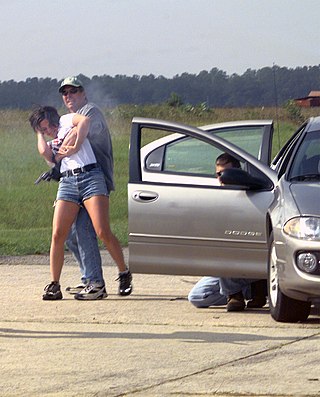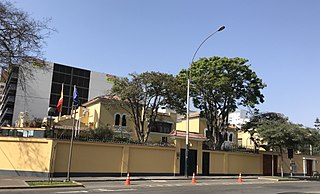
The Túpac Amaru Revolutionary Movement was a Peruvian Marxist-Leninist guerrilla army which started in the early 1980s. Their self-declared goal was to demonstrate to leftist groups in Peru that sought change through the current government the viability of radical revolution. The MRTA also aimed to provide an alternative to another militant group, the Shining Path, which placed them in direct competition. The group was led by Víctor Polay Campos until he was sentenced to 32 years' imprisonment in 1992 and by Néstor Cerpa Cartolini until his death in 1997.

Stockholm syndrome is a proposed condition or theory that tries to explain why hostages sometimes develop a psychological bond with their captors. It is supposed to result from a rather specific set of circumstances, namely the power imbalances contained in hostage-taking, kidnapping, and abusive relationships. Therefore, it is difficult to find a large number of people who experience Stockholm syndrome to conduct studies with any sort of validity or useful sample size. This makes it hard to determine trends in the development and effects of the condition, and in fact it is a "contested illness" due to doubts about the legitimacy of the condition.

A hostage is a person seized by an abductor in order to compel another party, one which places a high value on the liberty, well-being and safety of the person seized—such as a relative, employer, law enforcement, or government—to act, or refrain from acting, in a certain way, often under threat of serious physical harm or death to the hostage(s) after expiration of an ultimatum. The Encyclopædia Britannica Eleventh Edition defines a hostage as "a person who is handed over by one of two belligerent parties to the other or seized as security for the carrying out of an agreement, or as a preventive measure against certain acts of war."

The Iranian hostage crisis was a diplomatic standoff between Iran and the United States. Fifty-three American diplomats and citizens were held hostage in Iran after a group of armed Iranian college students belonging to the Muslim Student Followers of the Imam's Line, who supported the Iranian Revolution, including Hossein Dehghan, Mohammad Ali Jafari and Mohammad Bagheri, took over the U.S. Embassy in Tehran and took them as hostages. The hostages were held for 444 days, from November 4, 1979 to their release on January 20, 1981. The crisis is considered a pivotal episode in the history of Iran–United States relations.
Néstor Cerpa Cartolini was a member, then leader of the Peruvian Túpac Amaru Revolutionary Movement (MRTA). He was sometimes known by the nom de guerre "Evaristo". He was killed by Peruvian government forces during Operation Chavín de Huántar in 1997.

The Japanese embassy hostage crisis began on 17 December 1996 in Lima, Peru, when 14 terrorist members of the Túpac Amaru Revolutionary Movement (MRTA) took hostage hundreds of high-level diplomats, government and military officials and business executives. They were attending a party at the official residence of the Japanese ambassador to Peru, Morihisa Aoki, in celebration of Emperor Akihito's 63rd birthday. Although the crisis took place at the ambassadorial residence in San Isidro rather than at the embassy proper, it is often referred to as the "Japanese embassy" hostage crisis.

United States of America v. Islamic Republic of Iran [1980] ICJ 1 is a public international law case brought to the International Court of Justice by the United States of America against Iran in response to the Iran hostage crisis, where United States diplomatic offices and personnel were seized by militant revolutionaries.

The Chorrillos Military School is the institution in charge of the undergraduate education of officers of the Peruvian Army.

Bel Canto is the fourth novel by American author Ann Patchett, published in 2001 by Perennial, an imprint of HarperCollins Publishers. It was awarded both the Orange Prize for Fiction and PEN/Faulkner Award for Fiction. It was placed on several top book lists, including Amazon's Best Books of the Year (2001). It was also adapted into an opera in 2015.
The AIA Building hostage crisis took place at the AIA Building in Jalan Ampang, Kuala Lumpur, Malaysia on 5 August 1975. The Japanese Red Army took more than 50 hostages at the AIA building, which housed several embassies. The hostages included the United States consul and the Swedish chargé d'affaires. The gunmen won the release of five imprisoned terrorists and flew with them to Libya.
Breaking the Silence may refer to:

Canada–Peru relations are the current and historical relations between Canada and the Republic of Peru. Both nations are members of the Asia-Pacific Economic Cooperation, Cairns Group, Lima Group, Organization of American States and the United Nations.

José Daniel Williams Zapata is a politician and retired Peruvian Army general who served as President of the Congress of Peru, the head of the legislature and next in the line of succession for the Presidency of Peru. Williams currently represents the constituency of Lima in the Peruvian Congress as a member of Go on Country - Social Integration Party.

The 1974 French Embassy attack in The Hague was an attack and siege on the French Embassy in The Hague in the Netherlands starting on Friday 13 September 1974. Three members of the Japanese Red Army (JRA) stormed the embassy, demanding the release of their member Yatsuka Furuya. The ambassador and ten other people were taken hostage. The siege and negotiations lasted five days, resulting in the release of Furuya, the embassy hostages and a safe flight out of the Netherlands for the terrorists. During the incident, a café in Paris was bombed which was linked to the embassy crisis.

Las Palmas Air Base is a military airport in Santiago de Surco District, city of Lima, Peru. It is administered by the Peruvian Air Force, one of three branches of the Peruvian Armed Forces. The United States Air Force began operations there on June 1, 2023.

Japan–Peru relations are the current and historical relations between Japan and Peru. Both nations are members of the Asia-Pacific Economic Cooperation, Comprehensive and Progressive Agreement for Trans-Pacific Partnership and the Forum of East Asia–Latin America Cooperation.

The Embassy of Spain in Lima is the diplomatic mission of Spain in Peru. Its address is Av. Jorge Basadre 498, San Isidro, Lima.

The Embassy of Japan in Lima is the official diplomatic mission of Japan to the Republic of Peru.

The Embassy of Canada in Peru represents the permanent diplomatic mission of Canada in Peru. The embassy is also accredited to Bolivia.

The Embassy of France in Peru is the diplomatic mission of France in Peru.
















